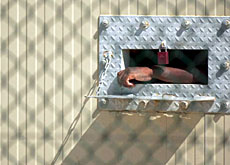Swiss gets to grips with human-rights mandate

Swiss parliamentarian Dick Marty tells swissinfo about the challenges of becoming chairman of a Council of Europe legal-affairs committee.
He also talks about the “serious matter” he has been handed of investigating allegations of secret Central Intelligence Agency (CIA) prisons in eastern Europe.
Marty said he had yet to see a firm denial of the allegations by the United States but said he will begin his work by presuming that the countries implicated have been wrongly accused.
He added that he hoped to present a comprehensive report in January.
Marty, a former state prosecutor, was appointed to the position on Monday by the Council of Europe’s parliamentary legal affairs committee.
swissinfo: What are the main tasks you face as chairman of the Council’s legal-affairs committee?
Dick Marty: The committee has a key role to play because it deals with issues concerning the implementation of the Human Rights Convention. And there is plenty of work to do.
Take the fight against terrorism as an example. We have noticed a disquieting willingness by authorities in some countries to give up fundamental human rights principles in an effort to combat terrorism.
But it is the wrong way to go about it, because it shows the terrorists that they have achieved one of their aims and it doesn’t make the fight against terrorism more efficient.
The rule of law has to be respected at all costs.
swissinfo: What do we know about the alleged secret prisons?
D.M.: So far all we have is a suspicion. But it is a serious matter if the allegations prove to be true. Secret prisons are against the rule of law.
Human Rights Watch, which published the report, is a respected non-governmental organisation. It must have its information from credible sources if it says it has evidence of the prisons.
We are taking the matter very seriously. We are calling on all our fellow parliamentarians to collect any information on such allegations.
swissinfo: Human Rights Watch singled out Poland and Romania as possible countries with secret CIA prisons. Are you planning trips to these regions?
D.M.: Yes, if necessary. But I don’t want to travel for the sake of travelling. What’s more, it’s by no means certain that these two countries are implicated.
Our first step will be to request information from the 46 member countries of the Council of Europe via its parliamentarians, from non-governmental organisations and from the European Commission.
The aim is to collect as much data as possible. For instance we will seek to get information on why US aircraft landed at airports even though there was no apparent need to do so.
swissinfo: You are a seasoned member of the parliamentary assembly of the Council of Europe. What have been the highlights of your career since 1998?
D.M.: I have had the opportunity to deal with a wide range of issues. I acted as speaker on proposals to set up an international criminal court. I was rapporteur on human rights violations in the Turkish part of Cyprus and on the issue of euthanasia.
It has been fascinating to witness the ongoing debates and different mentalities among the parliamentarians. That makes the Council of Europe unique.
swissinfo: What role does Switzerland play within the Council?
D.M.: The president of the European Human Rights Court is Switzerland’s Luzius Wildhaber.
The Swiss parliamentary delegation is very active, no doubt because we are not a member of the European Union. Parliamentarians from other countries, for instance France, are not quite as active in Strasbourg because they prefer the political stage of Brussels.
swissinfo-interview: Barbara Speziali
The Council of Europe is Europe’s oldest political organisation, founded in 1949.
It comprises 46 countries, including 21 from eastern and central Europe.
The Strasbourg-based Council is independent from the 25-nation European Union.
The Council defends human rights and parliamentary democracy.

In compliance with the JTI standards
More: SWI swissinfo.ch certified by the Journalism Trust Initiative












You can find an overview of ongoing debates with our journalists here . Please join us!
If you want to start a conversation about a topic raised in this article or want to report factual errors, email us at english@swissinfo.ch.